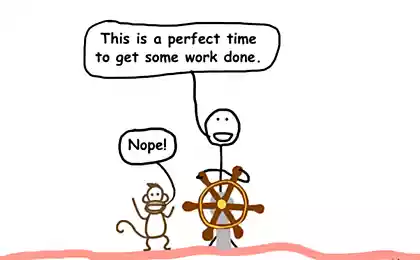218
How to Stop Making Excuses and Start Acting

Each of us has put off important things, coming up with various excuses. “I’ll start on Monday,” “It’s not a good time,” “I don’t have enough experience” — phrases like this all too often become a barrier between us and our goals. But what if we let go of self-deception and act now?
The psychology of excuses: why we deceive ourselves
Justifications are psychological defense mechanisms that help us avoid the discomfort of making decisions and acting. Research in cognitive psychology shows that our brains are prone to self-deception when it comes to stepping out of our comfort zone.
According to the American Psychological Association, about 20% of adults are chronic procrastinators, constantly putting off important things for later. At the same time, the vast majority of them masterfully rationalize their inaction, coming up with more and more excuses.
Justifications are paradoxical in nature: they create the illusion of protection, but in reality they become a prison that limits our development and prevents us from achieving what we want.
Typical excuses and their true causes
Before learning to overcome excuses, it is necessary to recognize them and understand the true causes of their occurrence.
- "I don't have time." This often masks incorrect prioritization or inability to organize the workflow.
- "I'm not ready/not qualified" This usually hides fear of failure or impostor syndrome.
- "This is not the right time." The classic manifestation of perfectionism, when we wait for ideal conditions that will never come.
- "It's too difficult." Reflection of unwillingness to leave the comfort zone or lack of a clear plan of action.
- "I'll do it later." The most common form of procrastination, based on the illusion that in the future we will be more motivated or conditions will be better.
Now that you’ve learned to recognize excuses, it’s time to explore specific strategies for overcoming them and moving into action.

1. Mindfulness practice
Learn to recognize the moment when you start making excuses. Mindfulness is the first step to change. When you hear your inner voice say “then” or “not now,” stop and ask yourself, “Is this the real reason or just an excuse?” ?
Mindfulness Pause Technique: Take a deep breath, count to five, and ask yourself, “What exactly is stopping me from starting right now?” ?
2. Decomposition method
Big tasks often paralyze us with their scale. Break down the global goal into small, concrete steps. Studies show that progress in small tasks stimulates the production of dopamine, a pleasure hormone that increases motivation for further action.
Use the two-minute principle – start with an action that takes no more than two minutes. This will reduce the psychological barrier to getting started.
3. If-then planning technique
Psychologists Peter Golvitzer and Gabriele Oettingen developed a method of “if anything” planning, which significantly increases the likelihood of accomplishing the plan. The essence of the method is to create specific situational triggers for action.
Example: “If it’s 7 a.m., I do a 15-minute workout,” or “If I notice I’m putting off an important task, I immediately give it 10 minutes of focused attention.”
Source: Gollwitzer, P. M., & Oettingen, G. (2011). Planning promotes goal striving. In K. D. Vohs & R. F. Baumeister (Eds.), Handbook of self-regulation: Research, theory, and applications.
4. Replacement of Negative Internal Dialogue
Our internal dialogue shapes reality. Replace phrases like “I can’t” with “I choose not to do this” to help you become aware of responsibility for your decisions and actions.
Reframing Technique: Replace “I can’t do it” with “How can I do it?” or “What exactly do I need to succeed?”
Remember, every time you choose an action over an excuse, you not only get closer to your goal, but you also strengthen the neural connections responsible for determination and self-discipline.
5. Accountability framework
Create a system of external accountability. Tell your friends about your plans, find an accountability partner, or join a group of like-minded people. Social pressure can be a powerful incentive to act.
Practical Tool: Enter into a “contract with yourself” with clearly defined goals, deadlines and consequences of not fulfilling them. Such a contract can be transferred to a trusted person or use special platforms such as Stickk.com.
6. The Swiss Cheese Method
This method, proposed by writer and consultant Alan Lackain, involves starting with any aspect of the task that seems most simple or attractive - as if you were making random holes in the task, like Swiss cheese.
The advantage of the method: does not require a strict sequence of actions, which reduces psychological resistance and simplifies the beginning of the process.
Overcoming deep psychological blocks
Sometimes excuses are rooted in deeper psychological blocks that require special attention and elaboration.
Fear of failure
Research shows that fear of failure is often the leading cause of procrastination and self-sabotage. Paradoxically, in order to avoid failure, we actually program ourselves into failure without taking the necessary action.
Dealing with fear of failure: Write your “worst case scenario” – what’s the worst thing that can happen if you fail? Then analyze how realistic this scenario is and what specific steps you can take to minimize the risks or manage the consequences.
Failure is not only an inevitable part of the road to success, but also a valuable source of experience and knowledge. As Thomas Edison pointed out, he didn’t fail 10,000 times when he invented an incandescent bulb—he found 10,000 ways that didn’t work.
Impostor syndrome
It is a condition in which a person cannot accept their achievements and is constantly afraid of being exposed as a “fraudster”. According to research, up to 70% of people have experienced symptoms of impostor syndrome at least once in their lives.
Working with Impostor Syndrome: Keep an achievement diary where you record all your successes, even the smallest. Review this list regularly to remind yourself of your competence.
Learn to accept compliments and positive feedback without internal resistance or attempts to devalue them.

Formation of the habit of acting
Overcoming excuses is not a one-time solution, but the formation of a new habit of acting against internal resistance.
Point of no return method
Psychologist and best-selling author Mel Robbins has developed a 5-second technique that helps overcome the brain’s initial resistance. Once you feel like you’re starting to make excuses, start counting down: 5-4-3-2-1 and then take action immediately. This method helps bypass the rational part of the brain that generates excuses and activate the prefrontal cortex, which is responsible for conscious choice.
“There is space between stimulus and response. In this space lies our power to choose our response. Our reaction is our development and our freedom.” - Victor Frankl.
Visualizing the process, not the result
Studies show that visualizing the end result can be demotivating, creating the illusion of achievement and reducing real motivation to act. Instead, psychologists recommend visualizing the process itself, imagining yourself overcoming obstacles and taking concrete steps toward a goal.
Exercise: Spend 5 minutes detailing how you take the first concrete steps toward your goal, how you feel, and what obstacles you overcome.
Practical tools for daily use
Theory must be supported by practice. Here are a few specific tools to help you incorporate your knowledge into everyday life:
- Rule 2 minutesIf something can be done in two minutes or less, do it immediately.
- Pomodoro techniqueWork for 25 minutes, then take a 5-minute break. After four such cycles, take a long break of 15-30 minutes.
- Diary of ExcusesWrite down all the excuses that come to your mind during the day and analyze their true causes.
- The "just start" methodCommit to working on the task for only 5 minutes. Usually, when you start, you will find that you are willing to continue for longer.
- The "Three Most Important Tasks"Every morning, identify the three tasks that need to be done first, and don’t let yourself get distracted until they’re done.
Conclusion: Start Acting Today
The path from justification to action is the path to personal freedom and fulfillment. Remember that overcoming excuses is a skill that, like any other, can be developed through systematic practice.
Don’t aim for perfect execution the first time. Be prepared for the fact that sometimes you will return to old patterns of behavior. It is important not to judge yourself for this, but to notice such moments and return to the practice of conscious action.
And most importantly, start right now. Apply at least one of these methods to a task you’ve been postponing. Remember, even the smallest action taken today is better than grand plans for tomorrow.
Glossary of terms
Procrastination
A tendency to constantly postpone important and urgent matters, leading to negative psychological effects such as guilt, loss of productivity, stress.
Impostor syndrome
A psychological condition in which a person is unable to acknowledge their achievements and constantly fears being exposed as a “fraudster”, despite obvious evidence of their competence.
Cognitive dissonance
A state of mental discomfort that occurs when there is a conflict between existing beliefs and new information or actions. It is often the reason for making excuses to reduce internal conflict.
Prefrontal cortex
The part of the brain responsible for planning, making decisions, controlling impulses and modulating behavior according to internal goals.
If-then planning technique
A method of creating specific situational triggers for actions that increases the likelihood of accomplishing the plan by associating certain situations with planned reactions.
The Swiss Cheese Method
An approach to solving complex problems that involves starting with any accessible or simple aspect, rather than following a strict sequence.
Pomodoro technique
The method of time management, developed by Francesco Cirillo in the late 1980s, involves the division of work into intervals of 25 minutes, separated by short breaks.
8 Signs That Indicate You Are In A Victim Condition
7 Ways to Make Your Phone Talk Interesting and Memorable























